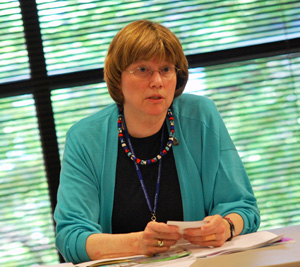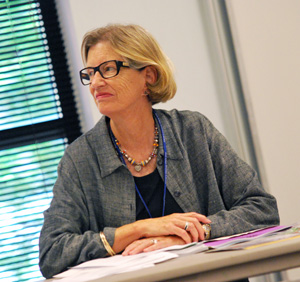Who Wants To Be on the Library Board?
Two potential candidates showed up Tuesday evening at an information session for the Nov. 2 Ann Arbor District Library board elections.

Rebecca Head, president of the Ann Arbor District Library board, spoke to a small gathering on Tuesday during an information session for potential board candidates. (Photos by the writer.)
Lyn Davidge and Greg Andrade say they haven’t yet decided whether to run, but they’re considering it. Four seats will be on the Nov. 2 ballot: three four-year terms and one two-year term. The four board members whose terms expire at the end of 2010 – Jan Barney Newman, Barbara Murphy, Carola Stearns and Ed Surovell – haven’t yet declared their intent to seek re-election.
The filing deadline for the AADL board candidates is 4 p.m. on Tuesday, Aug. 10. The positions are nonpartisan. To file, candidates must turn in an affidavit of identity to the Washtenaw County clerk’s office, along with a $100 non-refundable filing fee or a minimum of 40 valid signatures. [More details on the filing process are available on the clerk's website.]
At Tuesday’s event, board officers Rebecca Head, Prue Rosenthal and Margaret Leary spoke about the roles and responsibilities of the job. Stearns also attended, as did AADL director Josie Parker, and two associate directors – Ken Nieman and Eli Neiburger.
Current board members highlighted some of the reasons why they chose to run and what they most admire about the library system. For Leary, it’s the leadership of Parker and her staff – their fiscal responsibility, foresight and willingness to make tough decisions, especially in dealing with a tough economy. “I find very few public entities are able to do that,” she said.
One example Leary cited is the decision to call off – at least temporarily – a project to replace the district’s downtown library building. The effort was well underway when the economy “turned south,” Leary said, and Parker approached the board about putting the project on “pause.” [See November 2008 Chronicle coverage: "Citing Economy, Library Halts Building Project."]
Leary also noted that Parker has become a leader in this community on urban planning issues, as the downtown library on South Fifth Avenue is near several current and potential developments. One of those is an underground parking structure being built on the city-owned Library Lot, adjacent to the downtown library. Head noted that despite the name, it is not an AADL property. The city issued a request for proposals for potential developments to be built on top of the parking structure, but no projects have been selected. [The most recent update on that process was given by Ann Arbor city councilmember Stephen Rapundalo (Ward 2) at the city council's July 19, 2010 meeting.]

Prue Rosenthal, Ann Arbor District Library board treasurer, at the July 27, 2010 information session for potential AADL board candidates.
Rosenthal also praised the library staff’s leadership, especially in the context of taking on responsibility for the Washtenaw Library for the Blind and Physically Disabled, when the county decided that they could no longer support it. [See January 2009 Chronicle coverage: "Library for the Blind to Open Feb. 2 at AADL"] Rosenthal said that board members have been extremely proud of how the AADL staff has expanded and improved services for patrons who have visual or physical impairments.
Some of the questions to board members were pragmatic: How long do board meetings typically last? Art Davidge, a retired Pioneer High School teacher who attended with his wife Lyn, was viewing it in the context of Ann Arbor school board meetings, which often run past midnight. Lyn Davidge, who has volunteered worked at AADL as a substitute librarian for more than 10 years, also has experience with school board meetings – her father, Emerson F. Powrie, served as deputy superintendent for the Ann Arbor Public Schools in the 1970s. At that time, the library was part of the school system, and the library director reported to Powrie.
AADL board meetings are held on the third Monday of each month, and typically don’t run later than 8 p.m., Leary reported. Board members also serve on a minimum of one committee: budget and finance, director’s evaluation, policy or executive.
Andrade asked about the role of the board’s policy committee. Were issues taken up in response to patron requests? Head said that sometimes Parker will bring up an issue, or sometimes it comes from a board member. She noted that they deal with bigger picture issues, not day-to-day matters.
Parker added that a lot of policies are dictated by statute, either state or federal. She typically reviews policies annually, to ensure that they’re in compliance with any changes that have occurred in state or federal law. Most recently there were two changes that the board approved at their May 2010 meeting, to update the conflict-of-interest and legal compliance (whistleblower) policies.
In response to a question about legal counsel, Parker clarified that the library doesn’t use the city attorney’s staff – AADL is a separate entity from the city and the public school system. AADL is its own taxing authority, and uses the Dykema law firm for most matters, she said. AADL also issues a request for proposals (RFP) to select an auditor for their annual audit. “In every way you can be separate from other governmental units, we are,” she said.
Andrade asked how many candidates typically vie for each seat. Head said that it varies – sometimes there’s competition, sometimes not. [For the last AADL board election, in May 2008, there was no competition. Surovell was the only candidate for one two-year seat, and there were four candidates for four four-year terms: Head, Leary Rosenthal and Jean King, who subsequently resigned. Stearns was appointed to replace her until the next election. Elections have been moved from May to November to align with school board elections. See Chronicle coverage: "Ann Arbor Library Board Moves Elections."]
There was also a discussion about attendance at public meetings, either by the library staff and union representation, or by the general public. Any individual can speak during public commentary at the regular board meetings, Head said, but staff issues are typically handled by the administration. Parker noted that there are two organized labor groups representing employees at the library – both are part of the Michigan Education Association (MEA). The board, working with a labor lawyer, negotiates and approves contracts with those unions.
Rosenthal said that the general public doesn’t usually attend the board’s monthly meetings, noting that “it’s kind of too bad!” There are no burning issues at the moment, she said, though there are plenty of items of public interest.
Parker pointed out that people don’t hold back on posting public comments on the district’s website. In some ways, that has replaced the need for people to come to the meetings. She said that library staff answer all questions online, except those that are posted anonymously.
The next information session – geared toward people who have filed to be AADL board candidates by the Aug. 10 deadline – will be on Wednesday, Aug. 11 from 6-7 p.m. at the downtown library, 343 S. Fifth Ave. in the third-floor freespace room. More information about the board is also online. Chronicle coverage of the board’s monthly meetings can be found here.



